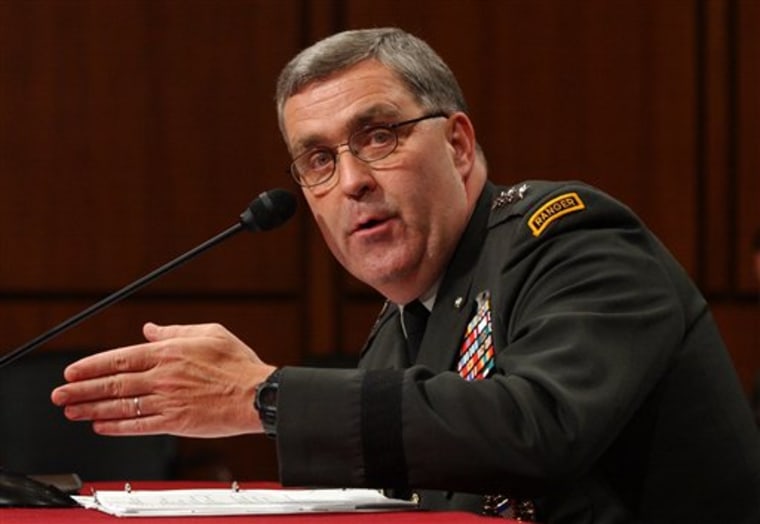The Army general picked by President George W. Bush to become his war adviser said Thursday he has serious misgivings about the Iraqi government's ability to take control of the country, no matter how much pressure the United States applies.
"The question in my mind is not to what extent can we force them or lever them to a particular outcome but rather to what degree do they actually have the capacity themselves to produce that outcome," Lt. Gen. Douglas Lute said during his confirmation hearing before the Senate Armed Services Committee.
"And if produced or if pressed too hard will we, in turn, end up with an outcome that isn't really worth the paper it's written on?" he added.
Call for patience questioned
The grim admission cast doubt on prospects of an easy U.S. withdrawal at a time Americans are increasingly impatient. In an AP-Ipsos poll released Thursday, 28 percent of Americans said they were satisfied with Bush's handling of the war - numbers that are deeply affecting Republicans as well as Democrats on Capitol Hill.
"Wake up," Republican Sen. John Warner said in response to Lute's suggestion that Americans should be more patient with the embryonic democracy in Baghdad. "We're paying a heavy price for them to establish this government."
Democrats, including panel chairman Sen. Carl Levin, say U.S. troops should begin to pull out of Iraq to put pressure on the Iraqis to take more responsibility and make political agreements that could help calm sectarian violence. Republicans have opposed a firm withdrawal deadline, although Warner and others say their patience is wearing thin.
"How much more time should we give after four years in Iraq?" asked Levin.
"Baghdad is burning while the Iraqi politicians avoid accepting responsibility for their country's future," he said. "I believe the only chance to get Iraqi politicians to stand up is when they know we are going to begin to stand down."
Baghdad's 'golden opportunity'
Last month, Bush signed war spending legislation that for the first time in the four-year war conditioned U.S. aid for the Iraqis on Baghdad's ability to meet certain milestones.
When pressed by Levin whether the United States should do more to persuade the Iraqis to act, Lute said Baghdad already is keenly aware they have a "golden opportunity" afforded them, and time is running out. But with the Iraqi government up and running for only about a year, Lute said there are limits to what it can do.
"I think that this isn't solely a question of leverage," he said.
Bush nominated Lute this month to become deputy national security adviser on Iraq and Afghanistan, a newly created position intended to reach across agency boundaries and execute the president's policy on the two wars better.
Lute said he will work closely with the national security adviser, Stephen Hadley, who will have a broader portfolio, as well as Defense Secretary Robert Gates, Secretary of State Condoleezza Rice and Gen. Peter Pace, chairman of the Joint Chiefs of Staff.
An impossible position?
Bush's decision to create the new position raised questions among lawmakers about its necessity and its ability to improve conditions in Iraq.
"If those other individuals were properly doing their job, this position wouldn't be necessary," said Democratic Sen. James Webb, referring to other administration officials with purview over Iraq policy.
Added Sen. Hillary Rodham Clinton, considered a top Democratic presidential candidate: "I wish you well in a position many of us believe is an impossible one."
Earlier this year, Lute questioned Bush's strategy of sending thousands more troops into Iraq.
In a written response to questions by the Senate panel, Lute confirmed news reports that he had voiced doubts during a White House-led policy review before Bush's announcement Jan. 10 that 21,500 more combat troops would go to Baghdad and Anbar province.
"During the review, I registered concerns that a military `surge' would likely have only temporary and localized effects unless it were accompanied by counterpart `surges' by the Iraqi government and the other, nonmilitary agencies of the U.S. government," Lute wrote in a document obtained by The Associated Press.
On Thursday, Lute told the panel that early results of the U.S. troop buildup in Iraq were mixed, and Iraqi participation has been uneven.
"I think we're in the early days, and time will tell," he said.
